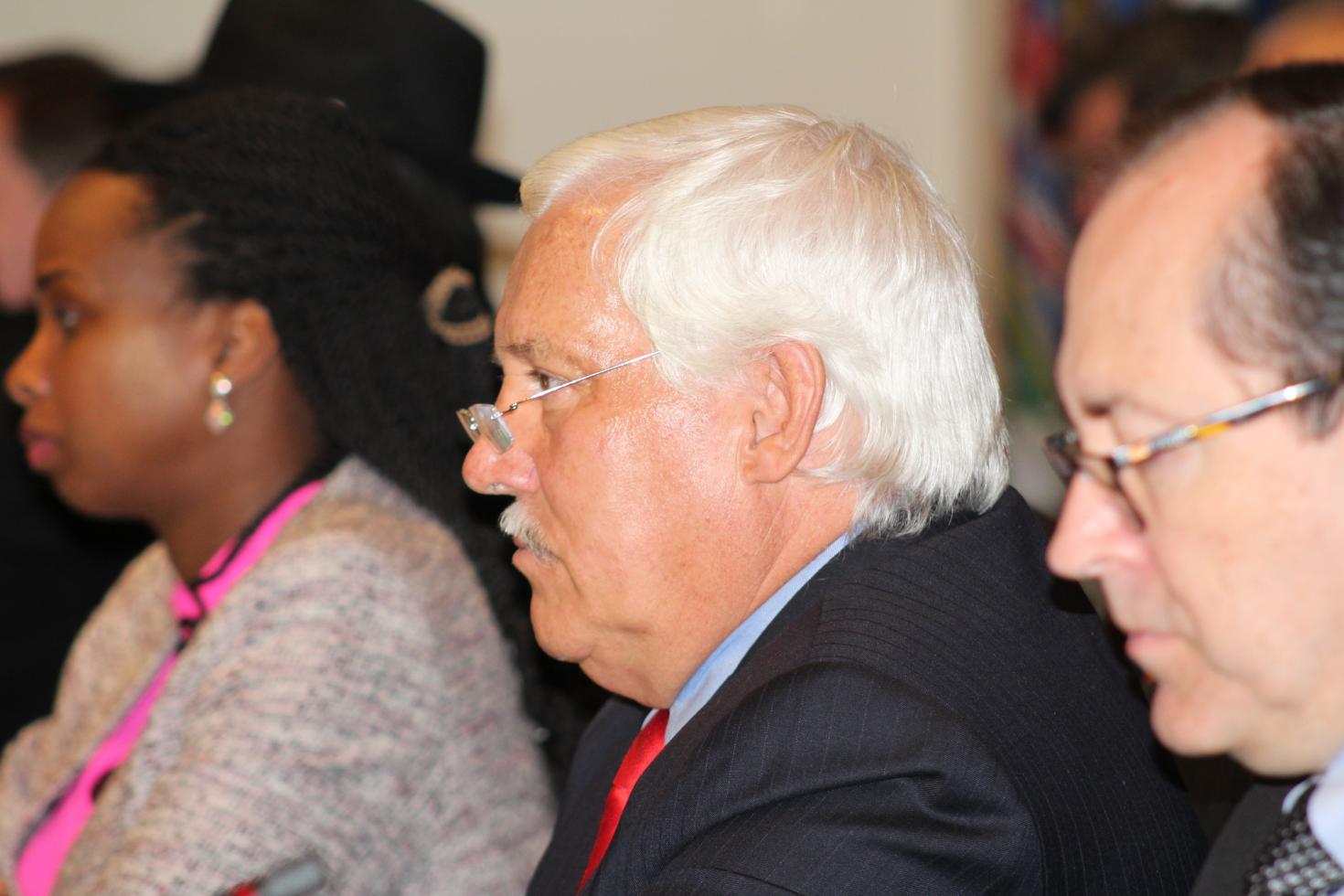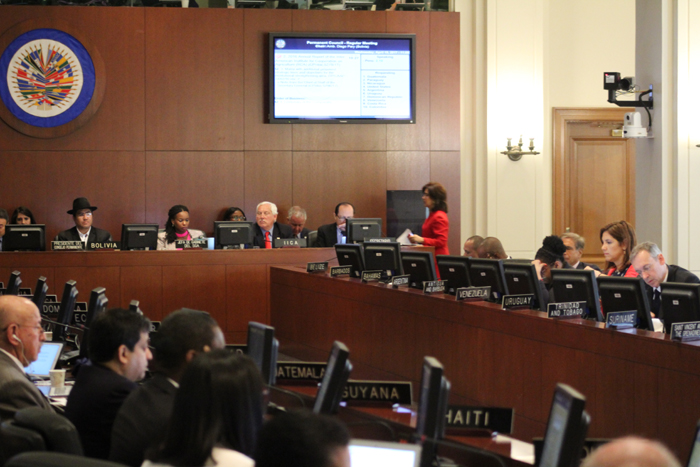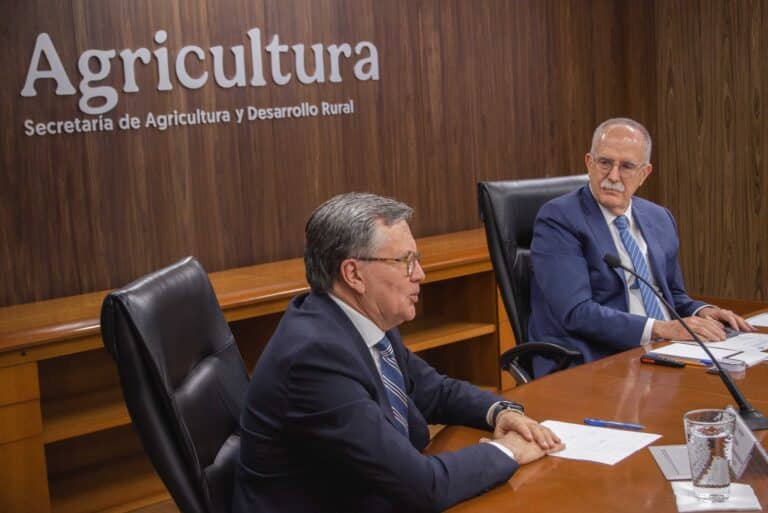The Director General of IICA presented the Institute’s 2016 Annual Report to the Permanent Council of the OAS. Country representatives highlighted the Institute’s contributions to agriculture in the hemisphere.

Washington, 24 April 2017 (IICA). The Permanent Council of the Organization of American States (OAS) recognized the results that the Inter-American Institute for Cooperation on Agriculture (IICA) has achieved as part of its efforts to increase productivity, strengthen family agriculture, adapt agriculture to climate change, foster inclusion in rural territories, and increase food security.
The Director General of IICA, Víctor M. Villalobos, presented the 2016 Annual Report to the ambassadors that form part of the Council, at the OAS headquarters in Washington. This was the last time that Villalobos will be presenting an annual report to the OAS, given that his term as Director General will end in 2018.
Luis Alfonso de Alba Góngora, Ambassador of Mexico, urged Council members to continue to support the Institute’s work and participate in funding its projects. He highlighted the projects that the Institute has developed in the Caribbean region and in Central America.
“IICA possesses financial solvency and technical capacity; nevertheless, we must continue to strengthen and provide the Institute with a greater number of improved tools to increase the impact of its contributions to the achievement of the objectives set forth in the 2030 Agenda for Sustainable Development,” stated the Mexican ambassador.
“We were at IICA in Coronado (Costa Rica) when Dr. Villalobos assumed his duties and began his term with the same level of enthusiasm with which he now is ending it. Evidently, his work has left a perfectly perceptible impression on the work conducted and the results obtained during his term in office,” stated Juan José Arcuri, ambassador of Argentina.
The Ambassador of the United States, Kevin K. Sullivan, also joined his colleagues in congratulating the Director General. “Our Delegation assigns a high priority to the work done by IICA, and considers it a vital component of our inter-American development strategy,” he stated.
During his presentation, the Director General of IICA summarized the Institute’s actions in its Member States using five robust pieces of information: 5 hemispheric projects, 12 multinational projects, 31 rapid-response actions, 12 regional integration mechanisms and 209 externally-funded projects whose execution called for total expenditure of close to USD 110 million.
“A very efficient way to provide technical cooperation is through capacity-building, an effort that IICA has undertaken for several years now in the field of agriculture. Up until 2016, the Institute had offered technical training to 34 thousand people,” he stated.
Néstor Méndez, Assistant Secretary General, closed the session by underscoring the importance of developing actions for the benefit of the agricultural sector, in order to foster development in the countries. “We must highlight the significant economic impact that IICA’s work has had in many countries. Not only has productivity increased, but there are also more training opportunities for our personnel,” he stated.
Méndez also highlighted the report that the Director General gave to each Ambassador, which he described as a transparent, detailed and concise account of the specific results achieved in each country. According to Méndez, the report sets a good example for other organizations that must prepare accountability reports.

Strengthening knowledge and technical cooperation
The strengthening of technical capacities in order to develop and deliver public goods that facilitate agricultural development in the Americas has been the primary focus of Villalobos’s administration. To accomplish this objective, the Director General has relied on a new technical cooperation model implemented in 2014 during his second term, which focuses on the achievement of results.
The training program that the Institute is implementing together with the government of Mexico, via the National Council on Science and Technology (CONACYT), has provided training to 16,934 persons and offered scholarships to 961 specialists to pursue postgraduate studies in a field related to agriculture. “As a Mexican, I am proud of the importance my country gives to international cooperation,” he stated.
True to his hardworking nature, and as a testament to his confidence in agriculture’s potential as well as his love for IICA, Villalobos also announced that during the Meeting of Ministers of Agriculture of the Americas in October, he will present a proposal geared toward increasing the effectiveness and efficiency of the Institute’s operation, as part of his efforts to defend the value of international technical cooperation.
“We are all responsible for guaranteeing food availability for a growing population, and for transforming our agricultural sectors into a source of economic development and social well-being. In spite of turbulent years characterized by financial instability, the sector has been capable of growing,” he stated.
More information:
Evangelina Beltrán, Coordinator of the Office of the Director General
Photo gallery (Courtesy of OAS)
Video – Annual Report Presentation (From minute 07:06 to 22:44)











